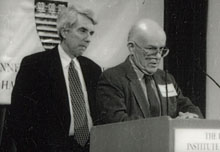2000 Awards

The 2000 Goldsmith Prize for Investigative Reporting was awarded to journalists from Time magazine. Donald L. Barlett and James B. Steele were presented the Prize for their series, “What Corporate Welfare Costs.” This is the second Goldsmith Award that Time magazine has won.
- Watch the Video
Launched in 1991, the Goldsmith Prize for Investigative Reporting honors journalism that promotes more effective and ethical conduct of government, the making of public policy, or the practice of politics by disclosing excessive secrecy, impropriety and mismanagement, or instances of particularly commendable government performance.
“We had many outstanding entries — a testimony to the high quality of investigative journalism in America,” said Thomas E. Patterson, acting director of the Shorenstein Center, “but Barlett and Steele’s series on corporate welfare stood out for its scope, depth and significance.”
Other finalists for the prize included Ken Armstrong and Maurice Possley, of The Chicago Tribune, for “Trial & Error”; Sang-Hun Choe, Charles Hanley, Randy Herschaft and Martha Mendoza, of The Associated Press, for “The Bridge at No Gun Ri”; Sam Roe, of The Toledo Blade, for “Deadly Alliance”; Robert Whitaker and Dolores Kong, of The Boston Globe, for “Doing Harm: Research on the Mentally Ill”; and David G. Willman, of The Los Angeles Times, for “Rezulin: A Billion Dollar Killer.”
The $5,000 Goldsmith Book Prize was also awarded to Robert W. McChesney, professor at the Institute of Communications Research, University of Illinois at Urbana-Champaign, for Rich Media, Poor Democracy: Communication Politics in Dubious Times (1999). The Goldsmith Book Prize is awarded to the best book that seeks to improve the quality of government or politics through an examination of the press and politics in the formation of public policy. “Professor McChesney’s book is a tour de force of the many issues facing the media today,” Patterson said.
This year’s Goldsmith Career Award for Excellence in Journalism was awarded to Bill Kovach, founding chairman of the Committee of Concerned Journalists. The award is given annually by the Joan Shorenstein Center to recognize and honor a journalist whose work has enriched our political discourse and our society.
The Goldsmith Awards Program also grants monetary awards for post-graduate research on the intersection of press and politics. This year, 10 people were given Goldsmith Research Awards. They are: Rosalind Barnett, Brandeis University and Radcliffe Institute for Advanced Study; Peter Eng, freelance reporter; David Niven, Florida Atlantic University; Caryl Rivers, Boston University; Evelyn Simien, Purdue University; Lynn Vavreck, Dartmouth College; Brian C. White, University of Illinois, Chicago; Mark A. Wolfgram, University of Wisconsin, Madison; Julian E. Zelizer, State University of New York, Albany; and Jeremy Zilber, College of William and Mary.
The annual Goldsmith Awards Program receives financial support from the Goldsmith-Greenfield Foundation. The Shorenstein Center was established in 1986 to promote greater understanding of the media by public officials, to improve coverage by media professionals of government and politics, to better anticipate the consequences of public policies that affect the media and the First Amendment, and to increase knowledge about how the media affect political processes and government institutions.
This article is based on one in the Harvard Gazette.
Ceremony Date
March 9, 2000
Note
The annual Goldsmith Awards Program is funded by the Greenfield Foundation.


